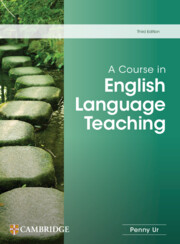Book contents
- Frontmatter
- Contents
- Acknowledgements
- Introduction
- 1 Teaching English today
- 2 The lesson
- 3 Classroom interaction
- 4 Tasks
- 5 Texts
- 6 Teaching vocabulary
- 7 Teaching grammar
- 8 Teaching listening
- 9 Teaching speaking
- 10 Teaching reading
- 11 Teaching writing
- 12 Feedback and error correction
- 13 Assessment and testing
- 14 The syllabus
- 15 Teaching/learning materials
- 16 Teaching content
- 17 Classroom discipline
- 18 Digital technology and online teaching
- 19 Learner differences 1: age
- 20 Learner differences 2: diversity and inclusion
- 21 Teacher development
- Glossary
- References
- Index
- Frontmatter
- Contents
- Acknowledgements
- Introduction
- 1 Teaching English today
- 2 The lesson
- 3 Classroom interaction
- 4 Tasks
- 5 Texts
- 6 Teaching vocabulary
- 7 Teaching grammar
- 8 Teaching listening
- 9 Teaching speaking
- 10 Teaching reading
- 11 Teaching writing
- 12 Feedback and error correction
- 13 Assessment and testing
- 14 The syllabus
- 15 Teaching/learning materials
- 16 Teaching content
- 17 Classroom discipline
- 18 Digital technology and online teaching
- 19 Learner differences 1: age
- 20 Learner differences 2: diversity and inclusion
- 21 Teacher development
- Glossary
- References
- Index
Summary
Functions and types of assessment
The main reasons for trying to assess English proficiency are as follows:
1 In order to determine learners’ overall level: for example, we may want to specify their level according to the Common European Framework of Reference for Languages (CEFR), or let them or their parents or employers know how good their English is, or assign them to an appropriate course.
2 In order to assess learners’ progress: we may want to give feedback showing how much a learner has improved since the last assessment.
3 In order to find out how well learners have learnt specific material during a course: we may wish to know how well they know a set of vocabulary items, a text or a grammatical feature.
4 In order to evaluate learners’ strengths and weaknesses (diagnostic assessment): so that the learners themselves can be aware of what they need to learn, and so that we can plan our teaching appropriately.
5 In order to evaluate our own teaching: often the results of learner assessment can provide useful feedback on how well we as teachers have been enabling students to learn.
Summative and formative assessment
The most formal and prestigious types of assessment, such as state school-leaving exams, or international exams such as IELTS or TOEFL, are summative in nature: they provide only a numerical grade, may offer no specific feedback on aspects of performance, and summarize or conclude a period of learning. Summative assessment may be used as a basis for selection, or for acceptance into further education or employment. It may contribute little or nothing to ongoing teaching and learning; however, it is a part of the teacher's job and we need to know how to do it effectively. Items 1 and 2 of the list of reasons for assessment on the previous page are used mainly for summative purposes.
In contrast, most of the assessment that we carry out during a course (tests at the end of units in a coursebook, for example) is formative: it may, like summative assessment, provide a numerical grade, but it happens in the midst of a period of learning rather than at the end, provides clear feedback in the form of error correction and suggestions for improvement, and has the primary aim of enhancing future learning.
- Type
- Chapter
- Information
- A Course in English Language Teaching , pp. 176 - 194Publisher: Cambridge University PressPrint publication year: 2024

